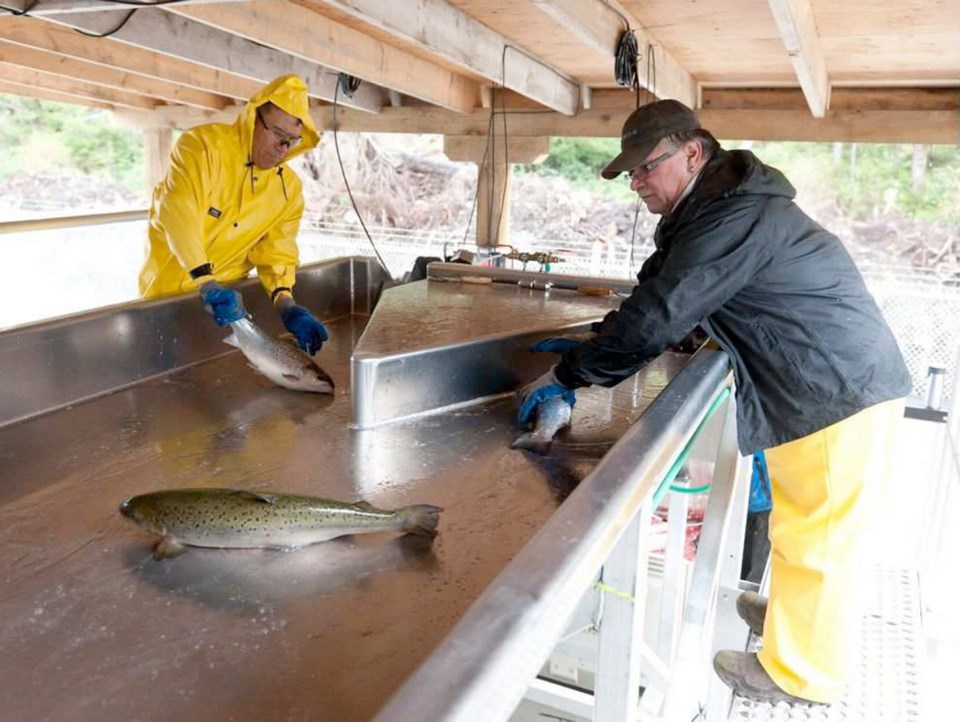VANCOUVER — A B.C. MP’s private member’s bill would see this province’s ocean-based salmon farms move to land-based facilities within five years.
“Since I’ve been an MP, we’ve had the second-worst return of sockeye salmon in history in 2009 and this summer has been the worst in history,” said Fin Donnelly, federal New Democrat MP for Port Moody-Coquitlam. “We’ve had one good year, but the majority have not been good and open-net salmon farms are harming wild salmon.”
Donnelly’s appeal for the support of B.C.’s federal Liberal MPs includes a statement of support from Canadian actor William Shatner on Donnelly’s website, findonnelly.ndp.ca.
Although the chances of a private member’s bill gaining royal assent are slim, “this is a chance for MPs to vote their conscience and choose to protect wild salmon,” Donnelly said.
“B.C. has a real chance to be a world technology leader in closed containment [salmon farming] if the federal government does the right thing and moves on this.”
B.C.’s land-based Atlantic salmon farm is struggling to break three years in, even after being given $10 million in government and philanthropic cash to build and operate the facility and selling fish at a premium price.
Kuterra — which boasts industry-leading sustainability credentials — sells for 15 per cent more than conventional farmed Atlantic salmon, according to distributor Albion Fisheries.
Despite the company’s financial struggles, Kuterra CEO Garry Ullstrom said the facility near Port McNeill played an important role in proving that closed containment could work. The company has made all its data publicly available as a means to catalyze a land-based aquaculture industry.
The aquaculture industry is starting to show confidence in land-based systems, he said.
Closed containment farms being built in Denmark and Norway are using an entirely new generation of technology and building at a scale astronomically larger than Kuterra, Ullstrom said.
Kuterra is designed to produce 470 tonnes of salmon a year, compared with new commercial farms designed to produce 5,000 to 20,000 tonnes.
Ullstrom is shopping for new financial backers to transition Kuterra from a research and development operation to a profit-making venture by massively expanding the operation and building a hatchery.
Donnelly and a group of B.C. MPs will tour the Kuterra salmon farm on Thursday.
The B.C. Salmon Farmers Association said Donnelly’s five-year timeline would devastate the aquaculture industry.
“This would spell the end of the industry in B.C.” said Jeremy Dunn, executive director of the association. “And we would soon see product from Chile and Norway on our store shelves.”
Every farmed salmon produced in B.C. spends part of its early life in closed-containment farms on land, but only a tiny fraction are grown to market weight without spending time in ocean-based pens, and most of those are steelhead and coho.
However, growing salmon to market weight in closed containment while turning a profit has “not proven out,” Dunn said. “Donnelly tried to introduce this bill in 2010, and land-based aquaculture isn’t any further along as a viable option now than it was then.”
Convincing the industry to invest in land-based facilities could also be tricky.
A 2010 study by Fisheries and Oceans Canada on competing aquaculture technologies found that a typical ocean net pen farm costs about $5 million to build and provides a 52 per cent return by its third year of operation. A similarly productive land-based facility would cost $22.6 million and return four per cent.
According to that report, “[Recirculating aquaculture systems] are likely to be considerably more sensitive to market forces that are beyond an operator’s control [such as exchange rate and market price], and may prove nonprofitable within a range of variability that has been experienced by the Canadian salmon aquaculture industry in the past.”
However, Ullstrom said advances in rearing techniques, technology and the increased scale of closed-containment systems now under construction render the report’s conclusions meaningless.
For now, British Columbia is experiencing a modest expansion of ocean-based salmon farming.
DFO issued four new ocean-based aquaculture licences for the West Coast last summer, three of which are beginning operations this year. A handful of other farms have been enlarged.
Farm-raised Atlantic salmon is B.C.’s biggest value agri-food export.



